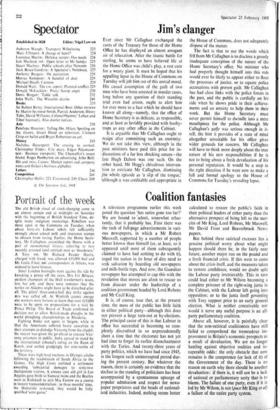Coalition fantasies
A television programme earlier this week posed the question 'has satire gone too far?' We are bound to -admit, somewhat reluc- tantly, that it probably has. First there was the rash of full-page advertisements in vari- ous newspapers, in which a Mr Robert Maxwell, supported by a number of people better known than himself (or, at least, so it appeared until most of them subsequently claimed to have had nothing to do with it), urged the nation in its hour of dire need to seek salvation by hoarding old newspapers and milk-bottle tops. And now, the Guardian newspaper has attempted to cap this with the revelation that moves are afoot to rescue us from disaster under the leadership of a coalition government headed by Lord Robens and Mr Cecil King.
It is, of course, true that, at the present time, the mass of the public has little faith in either political party—although this does not prevent a large turn-out at by-elections. The principal cause of this is that Labour in office has succeeded in becoming so com- pletely discredited in so unprecedentedly short a time that the electorate has not yet had time to forget its earlier disenchantment with the Tories. And twenty-three years of party politics, which we have had since 1945, is the longest such uninterrupted period dur- ing the present century. But whatever the reason, there is certainly no evidence that the decline in the standing of politicians has been accorppanied by a spontaneous upsurge of popular admiration and respect for news- paper proprietors and the heads of national- ised industries. Indeed, nothing seems better calculated to restore the public's faith in their political leaders of either party than the alternative prospect of being left to the mer- cies of Mr King, Lord Robens, Mr Maxwell, Mr David Frost and Beaverbrook News- papers.
But behind these satirical excesses lies a genuine political worry about what might happen should there be, in the fairly near future, another major run on the pound and a fresh financial crisis. If this were to come about the crisis itself, and the measures taken to restore confidence, would no doubt split the Labour party irretrievably. This in turn could lead either to Mr Wilson becoming a complete prisoner of the right-wing junta in the Cabinet, with the Labour left going into opposition; or to the junta itself governing with Tory support prior to an early general election. What is neither conceivable nor would it serve any useful purpose is an all- party parliamentary coalition.
Above all, however, it is painfully clear that the non-satirical coalitionists have still failed to comprehend the tremendous im- provement in Britain's economic prospects as a result of devaluation. We are no longer battling against objective realities and in- superable odds : the only obstacle that now remains is the competence (or lack of it) of the Government of the day. There is no reason on earth why there should be another devaluation : if there is, it will not be a lack of national or parliamentary unity that is to blame. The failure of one party, even if it is led by Mr Wilson, is not (pace Mr King et al) a failure of the entire party system.


































 Previous page
Previous page